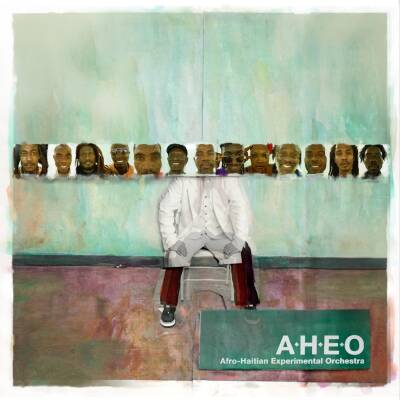Afro-Haitian Experimental Orchestra - s/t (feat. Tony Allen)
- Obserwuj produkt:
- Add feedback:
- Manufacturer: Glitterbeat
-
Availability:
 In stock
In stock
- szt.
- Net Price: €10.46 €12.86
Seven-and-a-half thousand kilometres of cold ocean separate West Africa from Haiti. But music can cover that distance in a heartbeat, crossing the Atlantic to reunite the rhythms and religion of people torn from their homes to be sold into slavery on the Caribbean island. And on its self-titled album, the Afro-Haitian Experimental Orchestra honours those ghosts of the past even as it walks steadfastly and hopefully into the future.
Experimental by name, the band was definitely experimental by nature. The concept started with Corinne Micaelli, the director of the French Institute in Haiti. She wanted to bring drummer Tony Allen, the power behind Afrobeat and one of modern music’s towering figures, to the island. A performance with Haitian musicians at a major public concert would be perfect. Allen agreed, and Erol Josué, a singer, dancer, voodoo priest, and director of the Haitian National Bureau of Ethnology, helped to recruit local percussionists and singers. They decided, in order for different strands of Haitian music to be represented, that the musicians would be drawn from a cross-section of the country’s foremost bands, including Racine Mapou de Azor, RAM, Erol's own band, the Yizra'El Band and Lakou Mizik, the group of Sanba Zao, one of Haiti's leading percussionists and traditional singers. Together, the musicians had just five days to compose and rehearse the set they’d play in the main square of Haiti’s capital, Port-au-Prince, and broadcast live throughout the country.
“Putting it together was complete chaos,” recalls Mark Mulholland, who was drafted in as the Orchestra’s guitarist. “Madness. We were all in this tiny room, playing. We had 10 percussionists from all of Haiti’s top bands. Then there was Tony, Olaf Hund on keyboards, and Jean-Philippe Dary, an old friend of Tony’s, on bass. He became the de facto musical director. The sound was overwhelming.”
The music grew organically from long jams, some initiated by Allen and the other Western musicians, built around Allen’s Afrobeat rhythms and the grooves from Dary’s bass, like the eerie psychedelic dream of “Chay La Lou.”
“I’d find a riff and a few notes for the songs, but I tried to keep it simple,” Mulholland says. “The other songs came from the Haitian musicians. They grew out of voudou rhythms and a chant. All we had to do was put in some breaks. Honestly, I don’t think any of us knew what to expect when we began.”
What emerged from those long, hot sessions were a series of tracks with roots on both sides of the Atlantic, compelling layers of subtle polyrhythms that bridge centuries and cultures. Relentless grooves become the foundation for soaring, utterly modern melodies like the swirling, electronica-fuelled “Salilento” or the Afro Vocoder ritual sound of “Yanvalou” that’s inspired as much by Krautrock and Sun Ra as Lagos or Port-au-Prince. Flying on inspiration and adrenaline, it’s roots music for a global future. “When we played in public after those five days together we just hoped it would work,” Mulholland says. “The gig was a big festival, La Fête de la Musique, and a few bands had been on before us, so everything was running late and we were tense. Then, just before our set, someone set off a tear gas grenade in front of the stage.”
Eventually, the Afro-Haitian Experimental Orchestra was able to play. They’d hoped to record the event, but technical problems prevented that. And with some of the main players leaving the next morning it seemed that the music would be no more than a fleeting memory.
“We still had multi-track recordings from the rehearsals, though,” Mulholland continues. “I decided to go through them and see what I could find. I wasn’t even thinking of releasing it. I just wanted to preserve what we’d done for posterity. We’d achieved something, created something important. It deserved to be remembered. So we re-recorded all the vocals with Erol Josué, Sanba Zao, and the other singers.”
But life has a habit of springing surprises. Later in 2014, after Mulholland had moved to Bamako, Mali, he ran into Glitterbeat’s Chris Eckman.
“I told him about what we’d done in Haiti and Tony Allen’s involvement,” Mulholland says. “He wanted to hear it. When I sent it to him, even though it was raw, he could sense the power in the music. Glitterbeat was interested, so Olaf Hund and I did proper mixes on a couple of cuts. Those turned out well, and we went forward from there.”
The result captures the Afro-Haitian Experimental Orchestra sparking on all cylinders. The music is alive with the sense of spontaneity and adventure, the members supporting and pushing each other, diving headlong into the music and creating something that stands outside geography and genre.
“I think the album captures the spirit of all of us together in that room,” Mulholland says proudly. “It’s anarchic and energetic. And I really believe it’s good, it’s honest, it’s new. It’s different. It was an experiment that worked.” From the past to the future, it’s a sweep of music to grab and shake the listener. And proof that beautiful, dangerous music can rise out of chaos.
Tracklista:
01 Salilento
02 Chay La Lou
03 Yanvalou
04 Bade Zile
05 Poze
06 Pa Bat Kòw
07 Wongolo
08 Mon Ami Tezin


![Colin Newman - Bastard [2CD]](/media/products/05872d6adf7db4730152f24f8fd9a1f5/images/thumbnail/small_00162241.jpg?lm=1704643713)

![Fennesz - Endless Summer [vinyl 2LP rerelease 2022]](/media/products/72ffcfd2647b42728df9ad1cb4f97b36/images/thumbnail/small_endlesssummer2022.jpg?lm=1661364939)

![Mapa - No Automatu [vinyl 180g + downloadcode]](/media/products/d9498674f3ecb6d608fd1643225f4a36/images/thumbnail/small_MAPA-NO-AUTOMATU.jpg?lm=1617370436)